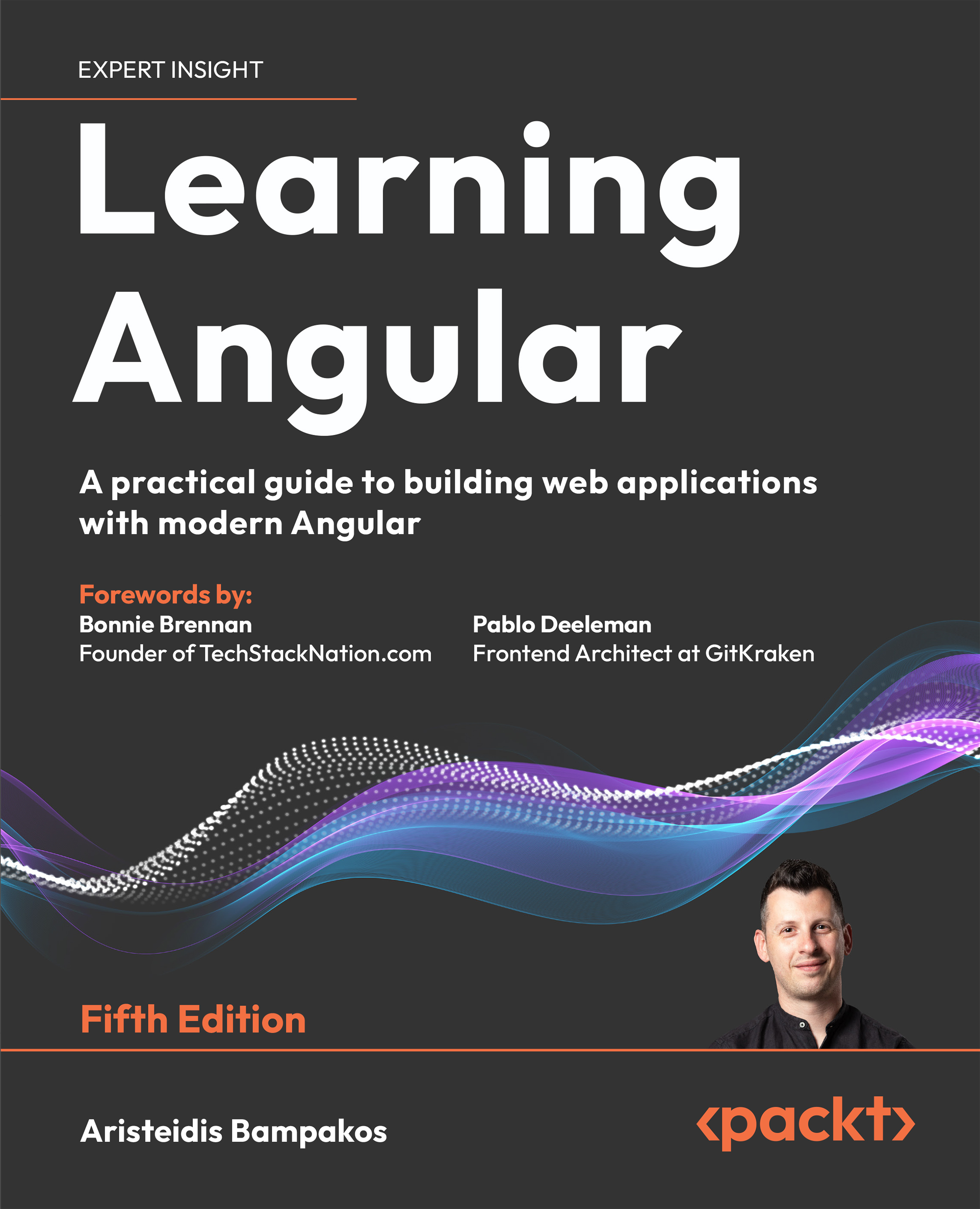First, we need to create our Vue CLI project. We can use the one we created in the last recipe or start a new one. To find how to create a Vue CLI project with TypeScript, please check the 'Adding TypeScript to a Vue CLI project' recipe.
Now, follow these steps to add custom hooks to your Vue project using TypeScript and vue-class-component:
- We need to add vue-router to the project. This can be done with the Vue CLI project creation or in the Vue UI interface after the project has been created.
If prompted about the mode, the vue-router should run. Take note that selecting the History option will require special server configuration when it's time to deploy.
- Open Terminal (macOS or Linux) or Command Prompt/PowerShell (Windows) and execute the npm run serve command, and you will see that the vue-router is working and that there are two working routers: home and about.
- Let's start creating and naming our hooks to register on the main application. To do this, we need to create a vue-router.js file inside the src/classComponentsHooks folder:
import Component from 'vue-class-component';
Component.registerHooks([
'beforeRouteEnter',
'beforeRouteLeave',
]);
- We need to import this file to the main.ts file as it needs to be called before the application final build:
import './classComponentsHooks/vue-router';
import Vue from 'vue';
import App from './App.vue';
import router from './router';
Vue.config.productionTip = false;
new Vue({
router,
render: h => h(App),
}).$mount('#app');
- We now have the hooks registered on the vue-class-component and they can be used inside the TypeScript components.
- We need to create a new router location called Secure.vue in the src/views folder. The secure page will have a password to enter, vuejs. When the user enters this password, the router guard will grant permission, and the user can see the page. If the password is wrong, the user will be taken back to the home page. When they leave the page, an alert will show a message to the user:
<template>
<div class="secure">
<h1>This is an secure page</h1>
</div>
</template>
<script lang="ts">
import { Component, Vue } from 'vue-property-decorator';
import { Route, RawLocation } from 'vue-router';
type RouteNext = (to?: RawLocation | false | ((vm: Vue) => any) |
void) => void;
@Component
export default class Home extends Vue {
beforeRouteEnter(to: Route, from: Route, next: RouteNext) {
const securePassword = 'vuejs';
const userPassword = prompt('What is the password?');
if (userPassword === securePassword) {
next();
} else if (!userPassword) {
next('/');
}
}
beforeRouteLeave(to: Route, from: Route, next: RouteNext) {
alert('Bye!');
next();
}
}
</script>
- Now with our page done, we need to add it to the router.ts file to be able to call it in the Vue application:
import Vue from 'vue';
import Router from 'vue-router';
import Home from './views/Home.vue';
Vue.use(Router);
export default new Router({
routes: [
{
path: '/',
name: 'home',
component: Home,
},
{
path: '/about',
name: 'about',
component: () => import('./views/About.vue'),
},
{
path: '/secure',
name: 'secure',
component: () => import('./views/Secure.vue'),
},
],
});
- With the route added and the view created, the final step is to add the link to the main App.vue file, and we will have a component with an integrated hook on it:
<template>
<div id="app">
<div id="nav">
<router-link to="/">Home</router-link> |
<router-link to="/about">About</router-link> |
<router-link to="/secure">Secure</router-link>
</div>
<router-view/>
</div>
</template>
<style lang="stylus">
#app
font-family 'Avenir', Helvetica, Arial, sans-serif
-webkit-font-smoothing antialiased
-moz-osx-font-smoothing grayscale
text-align center
color #2c3e50
#nav
padding 30px
a
font-weight bold
color #2c3e50
&.router-link-exact-active
color #42b983
</style>
 United States
United States
 Great Britain
Great Britain
 India
India
 Germany
Germany
 France
France
 Canada
Canada
 Russia
Russia
 Spain
Spain
 Brazil
Brazil
 Australia
Australia
 Singapore
Singapore
 Hungary
Hungary
 Ukraine
Ukraine
 Luxembourg
Luxembourg
 Estonia
Estonia
 Lithuania
Lithuania
 South Korea
South Korea
 Turkey
Turkey
 Switzerland
Switzerland
 Colombia
Colombia
 Taiwan
Taiwan
 Chile
Chile
 Norway
Norway
 Ecuador
Ecuador
 Indonesia
Indonesia
 New Zealand
New Zealand
 Cyprus
Cyprus
 Denmark
Denmark
 Finland
Finland
 Poland
Poland
 Malta
Malta
 Czechia
Czechia
 Austria
Austria
 Sweden
Sweden
 Italy
Italy
 Egypt
Egypt
 Belgium
Belgium
 Portugal
Portugal
 Slovenia
Slovenia
 Ireland
Ireland
 Romania
Romania
 Greece
Greece
 Argentina
Argentina
 Netherlands
Netherlands
 Bulgaria
Bulgaria
 Latvia
Latvia
 South Africa
South Africa
 Malaysia
Malaysia
 Japan
Japan
 Slovakia
Slovakia
 Philippines
Philippines
 Mexico
Mexico
 Thailand
Thailand















